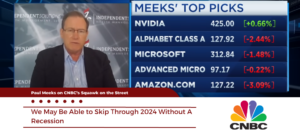In April 1980, which was at the end of President Jimmy Carter’s single (no surprise) term in office, inflation in the US peaked at 14.6%. Inflation is commonly measured by the Consumer Price Index (CPI). Think of it as the price of a basket of goods that most of us buy frequently. About a year and a half later, specifically in September 1981, President Ronald Reagan was still trying to tame inflation; and interest rates were sky high in response. The yield on the 10-year Treasury note, which often is called America’s “risk-free” rate, crested at 15.7%. For you “kids” reading this, these are historical facts. This is not a fable to get you to live your life right.
Fast forward 41 years and again there are lots of people anxious, me included, about inflation. To put this in perspective, CPI for May 2021 was “only” 5.0% although this gauge had been running at 2% plus or minus for decades. In recent memory, for only a few months in 1990 and 2008 had inflation spiked to today’s level. Please let this spike be transitory.
Despite surprisingly high inflation in April and May, stocks and most other financial assets have powered through it and post-COVID euphoria has led to a bull market. Those that keep buying believe that this inflation is just a blip, and it will subside once our supply chain inevitably catches up to voracious post-pandemic lockdown demand. Our central bank, the Federal Reserve Board (Fed), tells the same tale. Although after their recent quarterly meeting, Chairman Jay Powell, the most powerful person in free world finance in my view, admitted that he and his buddies at the Fed have raised their 2021 inflation forecast to 3.4% from their 2.4% projection just 90 days ago. Also, they plan to increase the Fed Funds rate by 0.50% in 2023. They had promised to wait until 2024 to lift this benchmark rate that sets the level for our borrowing. This may not sound like much to worry about, particularly not in June 2021, but on the margin, which is how financial analysts like me absorb and act on information, this may be “a thing.” Maybe inflation is not temporary as the bulls claim. Maybe it is structural. I think that there is an infinitesimal chance that we will have 1980-1981-type inflation even if this goes sideways, but if this two-month inflation surge becomes a trend then we could be in serious trouble.
There are several inflation components, calculations, etc. I cited the CPI above. However, I suggest that you keep a close eye on wage inflation because once this genie gets out of the bottle prices can spiral out of control and it can be too tough for the Fed to manage. Again, you Old Timers may remember that Fed Chairman Paul Volcker, who ran the central bank from 1979-1987, was forced to raise rates to the level highlighted above to break inflation’s back. In the end, it was necessary. However, the process was very painful.
Is this time different? Maybe. In the 21st century, technology rules the roost. Luckily, technology products and services often are deflationary. That is, you squeeze more out of them each year as their costs typically drop. Thus, workers can be more productive without necessarily being paid more. Well, that was the paradigm, but now companies are offering near bribes to get people back to work after the pandemic. McDonald’s is paying signing bonuses like a New York investment bank. American Airlines has cut routes because it cannot staff planes. Amazon.com has been forced to jack up the hourly rate for hundreds of thousands of workers. Yes, you can see how wage inflation can be a beast.
Readers know that I love to write about my “tells.” They can reveal the bigger picture, more important stuff. As you may know, the federal program that has paid hundreds of dollars a week during COVID to the unemployed ends in September. Between state and federal programs some folks have earned over a thousand dollars per week. Now the ball is in their court. They may not need to ship boxes from an Amazon warehouse. But let us see what happens once these support programs end. Will the power shift back to the employers? Will they be able to minimize and control wage inflation? Stay tuned. I will tell you how this works out at least on a national level. Maybe Charleston’s servers, hostesses, and bartenders on upper King Street can permanently squeeze more money and benefits out of their restauranteurs.
Before I conclude, we must recognize that the Fed only controls monetary policy. Its critics and inflation hawks have blamed it for potentially raising prices by keeping rates too low for too long. However, our friends in Congress manage fiscal policy. If they spend too aggressively, they also can trigger inflation. Between monetary and fiscal stimuli during COVID, the US has spent a combined $10 trillion. Sure, we have soared from the pandemic on this rocket fuel. However, if inflation does not subside after we reopen our economy and then it spirals out of control “easy” monetary and fiscal policies will have played a role in it.





